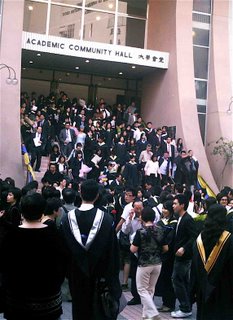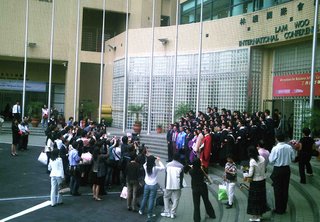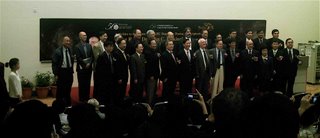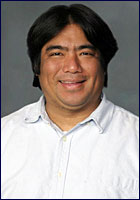Graduation in November


I know I haven't posted in a bit and it shows that these pictures are from November 13, last week Monday. They have graduation... in November! These are for the students who graduated last June. Apparently this is common in Hong Kong universities. It takes a while, apparently, for them to figure out who really graduated, and to send out announcements, etc. Those whose work will allow them to take the day off can come back and march.
They have several such ceremonies during Graduation Week. About eight of them, actually. They split the students up according to what degree they're getting. Each such ceremony has a certain day and place. The one for Monday was for those in Communication and MBAs of certain types.
Instead of Cum Laude and so on, they specify 1st class, 2nd class(1) and 2nd class(2) honors. To get 2nd class(2) honors you need a 2.5 GPA or higher. To get 1st class you need a 3.5 GPA (or something). I don't think they have as big a grade inflation there compared to Pepperdine.
The choir sang during this graduation, so I was there. Our main piece was a Mendelsohn piece "Ye Nations", though we also led the crowd in singing the University Anthem. This last one we practiced once. I think the conductor assumed most of us (and most of the audience) knew the piece, but judging from some of the choir members around me, that's not quite true. I had to practice it quite a bit because we sang it in Cantonese. They gave me the music with the words in Chinese characters. I had to ask for help, and because someone mistakenly took my copy, I had to look them all up in my dictionary. The person returned it on the day we were supposed to sing it
The last words were "tou leih gu dou yiht cheuhng" (桃李古道熱腸) whose characters literally mean "peach, plum, old road, hot intestines". I later found out that "peach plum" actually is a word for "students" (perhaps more poetic than "hohk sang", 學生, the usual word for students). I don't know what "old road" means or "hot intestines". I'm posting the Chinese characters because I know at least one person reading this blog knows Chinese and maybe they can post a comment to help.
After the graduation ceremony (the choir had to sit through it all, unfortunately, even though we only sang at the beginning) I went to hear John Polkinghorne and Yang. Polkinghorne is a physicist who decided to become an Anglican priest, and later served as a theologian in the Anglican church. He's written a lot on the interface between science and religion, and I'm in particular glad for his contributions, because he brings it beyond the whole creation-evolution business. The whole creation-evolution debate was once fun for me, but I came to terms with it ages ago, and now I'm tired of it, and I'm tired of the assumption that this is the only issue where science and religion can meet. I've met Polkinghorne at Pepperdine when he came to talk, and he was a very nice, down-to-earth guy who has thought about a lot of these issues very deeply. That being said, what he talked about was a small subset of what he has written, and I've read a few things that he's written, so nothing he said was new to me.
Since this was in a Chinese context, he didn't want to come right out and emphasize Christian doctrine per se, though in his books he has often explained the need for the dialogue to get to that point (Polkinghorne, Science and the Trinity). He stayed with natural theology: what can we know about God from the universe. And people have been hashing that over for quite a while before Polkinghorne, and afterward. I think Polkinghorne's main contributions are outside that: understanding how the picture science gives us of a universe that participates in creation (or if you prefer, a God that "empties himself" by willingly relinquishing His sovereignty over creation to creation itself), helps with understanding the fallen character of the world (the problem of why there is evil). And the religious hope of the new heaven and new earth answering the fatalistic pessimism of the fate of the universe that modern cosmology paints. (Polkinghorne, The God of Hope and the End of the World)
C.N. Yang is a physicist, who won the Nobel prize for developing a way to see how symmetry can help explain the fundamental forces of nature in a way that is consistent with quantum mechanics. This has been the foundations of particle physics since the 1950s. Yang said he used to be an atheist, and now he is coming to big questions about the meaning of life and the future of science and technology unfettered by ethical restraint, and he sees a role for religious faith. He is apparently quite a newcomer to the field of science and religion. Polkinghorne was the one being honored at the occasion with an honorary doctorate, but it was clear that the press and the locals saw Yang as the real draw. Nevertheless, Polkinghorne had much more to say on the subject.
I mentioned earlier (I'll find the post later) that Yang is known here, while no living American scientist is known in America. They even have a dorm at Hong Kong Baptist University named for Yang.
One student from mainland China who is a physics students, was very excited to see him, and he borrowed my camera so he could take a picture with Yang.
The Pepperdine students generally had a negative impression of the whole thing, it seems. Most were doing other things during the lecture, writing notes or doodling or staring into space. Afterward their main response was, "They were terrible. They just read from their notes." Yikes. Just a simple thing like that stopped them from being opened to some mind-bending ideas. We teach these students public speaking early on, and the flip side is that they are now turned off to anything that doesn't follow that mold.
Most non-Americans speak from prepared notes, especially on an important address like this one. Maybe we can say it's the non-Americans' fault for not practicing good oratory technique, but does that mean Pepperdine students will never be willing to listen to someone unless they're American? In some subjects, reading from papers is all you will ever see: historians and theologians come to mind. John was doing a pretty good job, too--just by listening, you could never tell he was reading from his notes except for a few times when the pages got stuck. His style was British academic--packed with insightful comments, delivered concisely. I wonder if the Pepperdine students were waiting for him to choose one point and say it three times (intro, statement, conclusion).
Yang didn't have as much to say, and he spoke more slowly (English being his second tongue), but depended more on his powerpoint presentation. The Pepperdine students were less harsh on him, but still weren't positive.
Speech 180 is one of the most important courses for what the students will be doing after they graduate, in a very practical sense. But I wonder if it can keep the students from really benefiting from important thinkers.
On a different note, the occasion was marked, Hong Kong style, with ceremony and picture-taking. All those involved in setting up this historic occasion lined up for photos. Actually there were three such groups, each with their photo shoot. This all took place before the lectures. The press went crazy. I think that without these ceremonies, the Hong Kongers would feel like it was less of a dignified event, somehow.




1 Comments:
I appreciated your comments on Speech 180 and the possibility that it is making our students less capable of appreciating a more formal academic presentation. Perhaps even in academia we're seeing the triumph of form over substance.
Post a Comment
<< Home